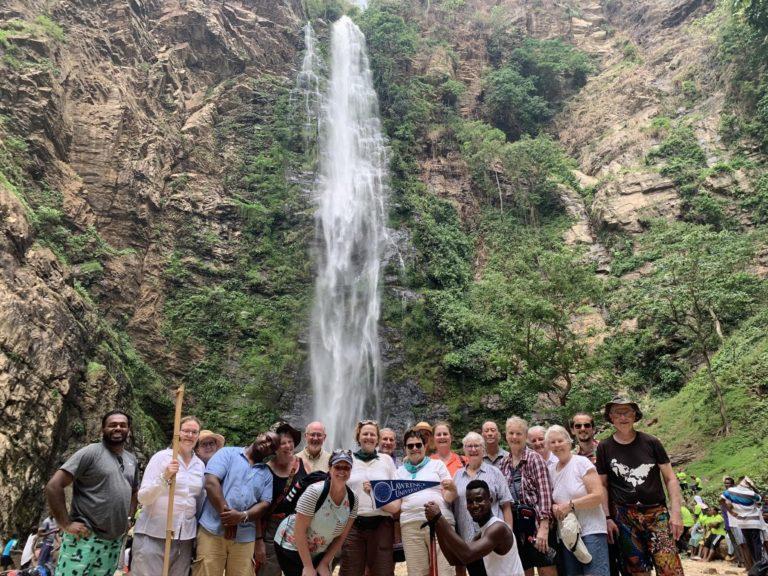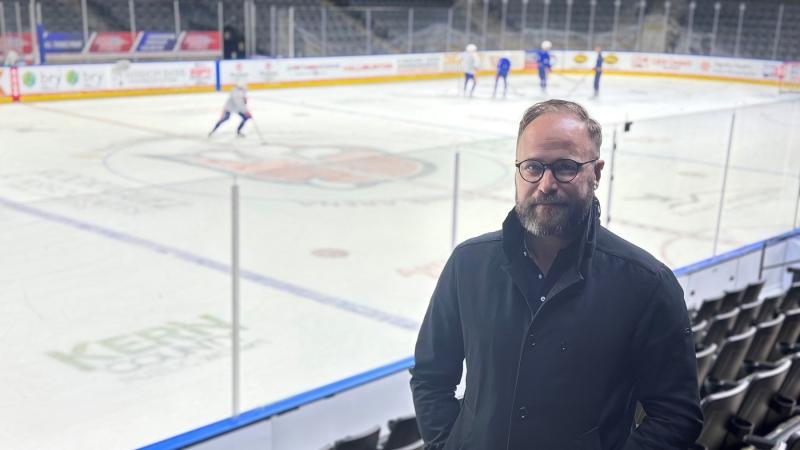Story by Jonathan Rubin ’19
Earlier this year, before COVID-19 was declared a pandemic and much of the world shut down, more than 20 Lawrentians and friends gathered in Accra, the capital of Ghana, to embark upon nearly two weeks of experiential learning, tours, wonderful food, and beautiful scenery.
It was led by Claudena Skran, Lawrence University’s Edwin and Ruth West Professor of Economics and Social Science and professor of government, and Stacy Mara, associate vice president of development. We traveled to almost all corners of Ghana, which is about a third as big as Texas but with two and a half million more people.
Our group was fortunate to have Sarah Ehlinger Affotey ’11 with us to help plan, coordinate, and engage the group. Sarah, who earned her first master’s degree from the University of Ghana and whose husband is Ghanaian, worked to ensure everything was set. Her insight and knowledge were invaluable.
Many of my travel companions are retired or decades deep into their careers. As a new Lawrence graduate (religious studies, 2019), it was fascinating to hear the perspectives and reactions of people far more experienced than my peer group. The adventures and discussions we shared will be with me forever.
For information on Lawrence alumni travel opportunities, see here.
I also was thrilled to find out that I would be traveling with my old friend and mentor, Wes Varughese ’16, who now lives and works in Dubai, United Arab Emirates. Wes was the Lawrence University Community Council (LUCC) president when I first arrived at Lawrence. He helped me get my footing at Lawrence, and, most importantly, persuaded me to join a field experience in Sierra Leone.

Wes Varughese ’16 (left) and Jonathan Rubin ’19 reconnected on the Ghana trip.
Thanks to Wes’s guidance — as well as life-changing advising from Professor Skran (and from Professor Martyn Smith in Religious Studies) — I found myself traveling around the world, first with professors from Lawrence, then through Associated Colleges of the Midwest (ACM) programs, and even as a U.S. State Department Critical Language Scholar in Indonesia. To share the Ghana trip with Wes gave me the sense of a circle brought around and completed.
Our exploration of Ghana was a rare opportunity to gather together as learners and thinkers from varied disciplines, industries, and career paths, and enjoy adventurous experiential education. As lifelong learners, Lawrentians know that these new experiences work their way into the fabric of our understanding, helping us to grow and connect with one another and with the world in new ways.
While Ghana might seem far from the banks of the Fox River in Appleton, Lawrence has deep connections to the first independent democratic nation in West Africa. Our trip followed in the footsteps of the December 2018 student field experience to Ghana.

Dr. Augustine Fosu ‘73 and his wife, Helen, hosted the Lawrence alumni group in Ghana.
One of our group’s first stops was to visit one of the first Ghanaian Lawrentians: Dr. Augustine Fosu ‘73. In 1968, as a young Ghanaian American Field Service (AFS) student in Milwaukee, he wrote to a Lawrence dean who happened to be coordinating the Peace Corps program in Ghana. A year later he would begin his undergraduate work at Lawrence. He would go on to receive his Ph.D. in economics from Northwestern, and today is one of the most decorated development economics professors in Ghana, while also holding positions at the University of Pretoria in South Africa and Oxford University in the UK.
Dr. Fosu invited us to the weekly graduate seminar at the Institute of Statistical, Social and Economic Research at the University of Ghana Legon. He gave a fascinating and challenging presentation about Ghana’s history and development, and about the paths and challenges ahead: education vs. infrastructure, foreign interest vs. development goals. The presentation provided a strong framework for understanding the country we would explore over the course of our stay.
That evening, Dr. Fosu and his wife, Helen, hosted our group and guests from around the world at a dinner party at their home. We sat outside on a warm, clear night at a dozen tables and enjoyed a traditional Ghanaian meal.
“It was a great experience at Lawrence … so much so that 40 years later, I encouraged my son to go to Lawrence, despite being admitted to other top universities in the U.S.,” Dr. Fosu said, addressing the group that evening. “I so valued my experience, and so I sent my son as well.” His son, Kofi, graduated from Lawrence in 2013.
After a few days in Accra, we made our way to the Cape Coast Slave Castle, and had the privilege to bear witness to difficult history. Facing the dehumanization of Africans so viscerally in the halls of a dungeon or staring from battlements across the ocean toward the United States, the Caribbean, and South America, we were left with lasting impressions. The group presented a gift to the site, a plaque from Lawrence, dedicated as Susan Goldsmith ’65 read Maya Angelou’s poem, “Still I Rise.”
After touring another castle in Elmina, we continued on to the rainforest at Kakum National Park. After learning a bit about the environment, we walked across rope bridges suspended dizzyingly high above the rainforest floor. It was exhilarating to see the jungle from this perspective. While the swing and sway of the bridges made us all a bit nervous, everyone finished the canopy walk and we were on our way to our next stop: the City of Kumasi.

Rope bridges at Kakum National Park posed their own challenges.
After a good number of engaging tours, museums, and markets, we had the pleasure of a private dance performance from a popular local traditional dance troupe. The evening of drumming, dancing, and local club beer was a delight.
From Kumasi, we went on to the Volta River region and stayed at a wonderful riverfront eco-lodge hotel. Electricity for the entire country is generated by the Akosombo Dam and hydroelectric facility on the Volta River.
Our group was lucky to be joined for this part of our tour by another Lawrence alumnus, Momodu Maligi ’04. Maligi was appointed by former Sierra Leone President Ernest Bai Koroma as the first Minister for Water Resources in his home country of Sierra Leone. Maligi outlined for our group the stark realities around access to clean water and to other utilities, and issues surrounding government intervention and foreign cooperation.
After a long and bumpy bus ride, we hiked through the rainforest and swam beneath a massive waterfall. Just as we had all changed back into our dry clothes, it began to pour. Ever resilient, we marched our way out of the rainforest and back to our vehicles. Despite being thoroughly soaked, it was a favorite moment.
From the Volta region, we made our way back to Accra and really began to feel the weight and value of our experience together. Since I graduated only last year, I was the youngest alumnus on the trip. I was moved by the strong connections I witnessed between Lawrentians, and saw our shared Lawrentian values put to work in real time — lifelong, joyful learning, meaningful and ethical engagement with the world, and intercultural learning.

Professor Claudena Skran (center) and Stacy Mara (front left) led the alumni trip to Ghana.
Professor Skran’s experiential learning model for her students adapted beautifully to our tour. Not only were we able to see the sites, taste the food, and shop in the colorful markets, we were able to contextualize all our experiences through the prism of what we were learning and discussing. Most importantly, we had a number of talented guides and local contacts who allowed us to connect to the people in the places we were visiting.
“Rarely does one get the opportunity to collaborate with someone so passionate and knowledgeable about their field of work,” Wes said of Professor Skran. “Her resourceful nature, holistic approach in her academic work, but most importantly her respect and inclusion of her students is the reason why so many Lawrentians have and continue to take field experience courses with Professor Skran, for over 15 years now. … She’s been extremely influential in my career thus far.”
Like Wes, these experiences and opportunities as a student changed my life. This trip to Ghana with these amazing Lawrentians affirmed for me the value of my Lawrence education and my pride in membership in our community.
As we said our goodbyes and headed to our respective homes, COVID-19 was becoming a grave new reality for our world. Our group has stayed in touch — we have all remained well, and I feel somehow sustained by the connections we forged.




